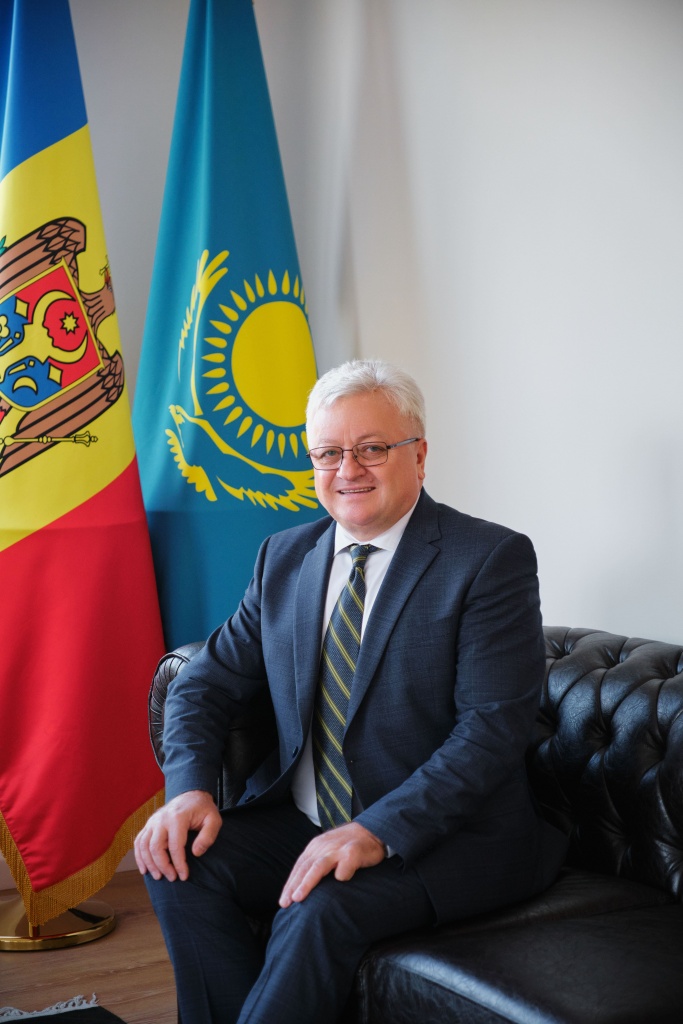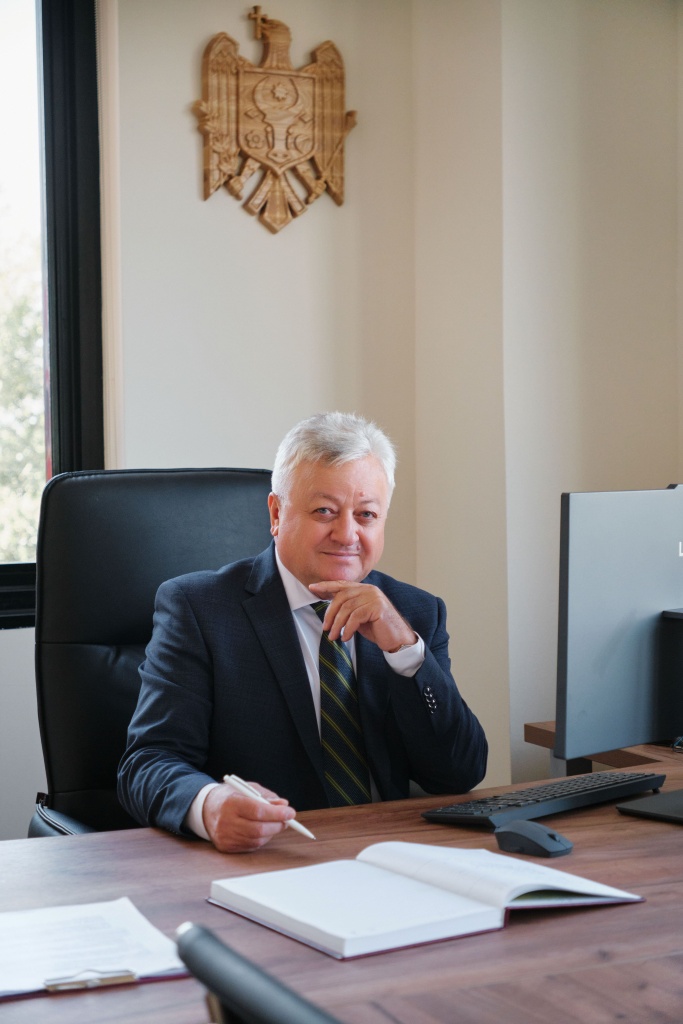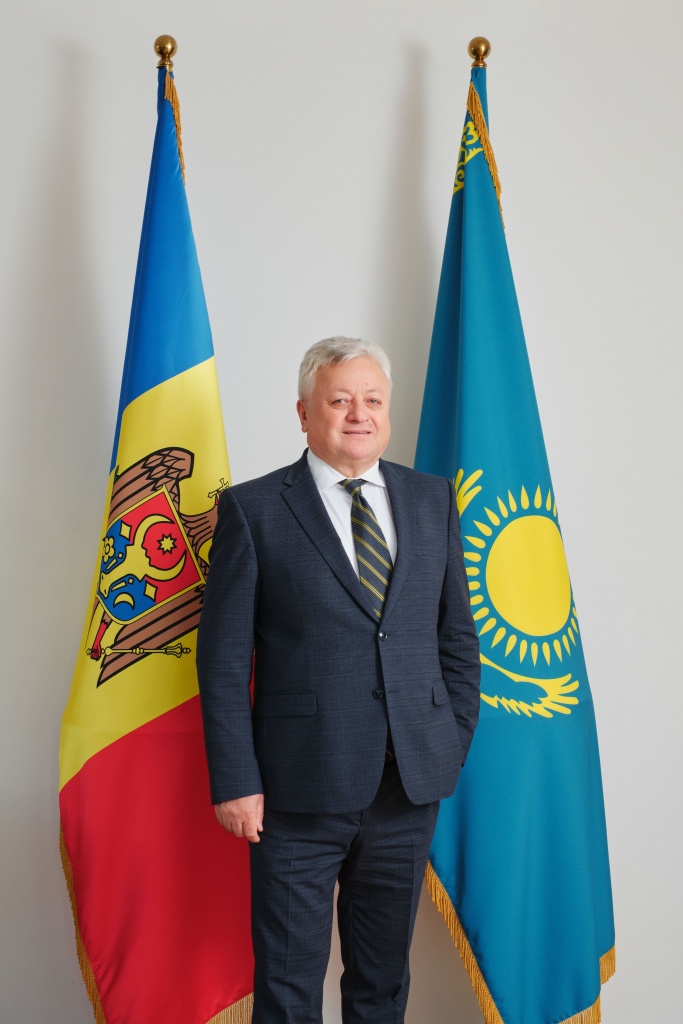Ștefan Gorda — Ambassador of Moldova to Kazakhstan, with many years of experience in international diplomacy. In an interview for weproject.media, he spoke about key areas of cooperation — from logistics and agriculture to education and sports diplomacy, and also shared his observations on Kazakhstan’s transformation and the prospects for strengthening bilateral partnership.
Ștefan Gorda, city — Astana, Ambassador of the Republic of Moldova to the Republic of Kazakhstan

About myself
I graduated from the Faculty of History in Chișinău. After receiving my diploma, I continued my studies in Moscow, where I obtained an education in oil and gas engineering, and then in Paris in international relations.
My professional path began at the Academy of Sciences. At the moment of the country’s independence, I was invited to the government. At that time, I held the position of advisor to the Prime Minister, and later, advisor to the President.
In 1998, I joined the Ministry of Foreign Affairs, where I realized that the work of a diplomat is my calling. I had the honor to represent our country abroad: in Tashkent, Paris, Kyiv, and for the first time, I became an ambassador in 2010 in the Czech Republic. In Prague, I spent five years, simultaneously holding the position of ambassador to the Vatican. In 2016, I was appointed ambassador to Bulgaria, where I also combined this role with diplomatic activities in North Macedonia and Albania. Then I worked for two years as director of the Diplomatic Institute at the Ministry of Foreign Affairs, and my last position was in Kyiv, where I was minister-counselor. And this year, I was appointed ambassador to Kazakhstan.
My experience includes not only diplomatic activity but also economic directions, work with the European Union, and cooperation in various international formats.
I love to write, to share thoughts, and consider myself an open person. I value sincere relationships with people. I believe that it is precisely the desire to understand others that helps achieve success in diplomacy. For me, diplomacy is not just work, but a mission and a part of my life.
About activities

In Kazakhstan, we opened the embassy on July 1. This was a priority of the current minister, Mihai Popșoi. Kazakhstan is the main country in the region, our key partner. It is also planned to subsequently accredit in the countries of Central Asia. At the moment, Turkmenistan and Uzbekistan are coordinated from Kyiv, and Tajikistan and Kyrgyzstan from Moscow, but this is not effective.
Between our countries, there are no unresolved issues, and Presidents Maia Sandu and Kassym-Jomart Tokayev maintain good relations. Moldova and Kazakhstan are building strong bridges of cooperation in different spheres: from industry and logistics to culture and education.
About activities in Central Asia
Kazakh enterprises are participating in the restoration of the railway in Moldova. A contract for $115 million has already been signed — the project has potential for expansion.
Cooperation with Kazpost is being planned. They are studying the possibility of creating a logistics hub in Moldova, so that later, through our country, deliveries to Eastern and Central Europe can be carried out. This is a strategically advantageous decision, since Moldova is a candidate for accession to the European Union and may become a convenient entry point to the European market for Kazakh businesses.
Our universities are interested in establishing ties with Kazakh colleagues. We plan to bring here a delegation of rectors and deans to discuss student exchange and joint programs.
We want Kazakhstan to become for Moldova a gateway to Asia, and Moldova — a platform for Kazakh business to enter the European Union. Considering that the EU is the largest trading partner of Kazakhstan, our country can play a key role in deepening these economic ties.

There are examples of successful investments: a Moldovan dairy plant operates in Taldykorgan. It involves not only Moldovan and Kazakh but also the German capital. Also in Almaty, an ice cream factory with Moldovan roots operates successfully. All this is living confirmation that joint enterprises find fertile ground here.
One of the directions with great potential is agriculture. Moldova has significant potential in the field of breeding various seeds, and Kazakhstan imports them from Moldova. There is interest in creating joint enterprises in this field. Kazakhstan, in turn, can offer us high-quality breeding cattle and meat products.
We are also interested in energy cooperation. Kazakhstan possesses serious potential in this area, and Moldova could become one of the consumers of its resources.
In the transport, IT sphere, and especially in digitalization, Kazakhstan demonstrates advanced solutions. We are interested in studying this experience and implementing it in our country.
We are also developing cultural cooperation. Recently, a football match took place between the clubs “Astana” and “Zimbru”. The atmosphere was wonderful, true sports diplomacy.
I plan to visit all regions of Kazakhstan. I have been to Almaty and Kostanay regions, and I plan a trip to Turkestan. It is important for me to see the country not only on TV screens but with my own eyes, to better understand its spirit, people, and the features of the regions.
On Central Asia
My first visit to Kazakhstan took place back in 1998. At that time, I worked at the embassy in Uzbekistan. Shymkent was nearby, and I was interested to see how the neighboring country lives.
It was a special time — the late 90s, the transition period, when the market economy was only being formed. Everything was not easy: the familiar world literally cracked at the seams, and a new one was being born in its place.
I was in Astana in transit in 2003. At that time, the city was only beginning to form, and on the other bank of the Ishim, the construction of the first objects was underway. Today, it is a completely different picture: the scale of construction and the scope of modernization with which regional projects are being implemented cause genuine admiration.
Modern Kazakhstan is a mature, ambitious state with a clear vision of the future. When I write notes on Kazakhstan’s cooperation with the European Union, they make a strong impression on my colleagues. What we see here on the spot — Kazakhstan’s participation in key summits with the EU and China, economic forums with Germany, Italy, Japan — all this raises the country’s authority on the international stage.
As a diplomat, I well understand that keeping youth in the country is not a slogan, but a strategic task. Sending a talented young person abroad is not so difficult. Creating such conditions that a person wants to stay and knows that he can realize himself at home requires will and wisdom. In Moldova the president often repeats: “Our goal is to build Europe at home.” And I see that Kazakhstan is also going exactly this way.
Joint enterprises, development of transport infrastructure, new highways, ports, airports, logistics centers, universities, libraries — all this is not just infrastructure, this is the foundation of the future.